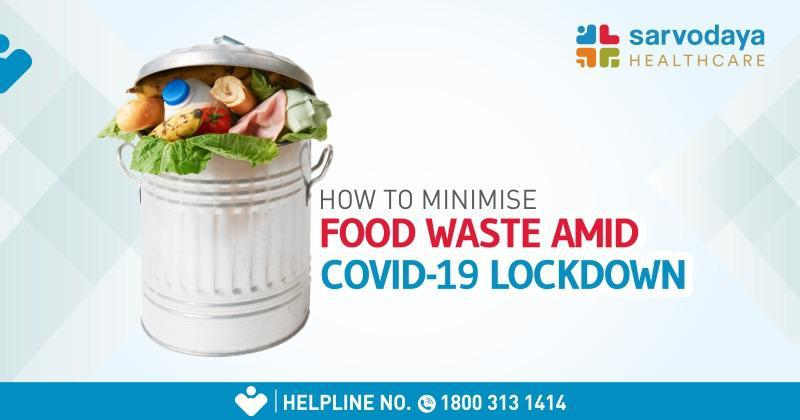The world is going through a difficult time when we all are forced to stay in “lockdown” as a preventive measure to control the spread of the deadly coronavirus disease. This has led to panic buying of extra food, groceries and daily essential needs, which is finally leading to unnecessary wastage. In this critical time, when we all are fighting COVID-19 together by staying inside, it has become more important than ever to reduce food waste and utilize our resources properly.
Following are some valuable tips by our Chief Dietician, Ms. Meena Kumari from the Centre for Dietetics & Nutrition, Sarvodaya Hospital, Faridabad on how to minimize food waste amid the COVID-19 lockdown.
Plan in advance to avoid Bulk Buying
Check for the food items you already have and then make a list of those you need. Plan meals for the upcoming week and list out food supplies you would require for the same. This will help you create a smaller grocery list, and avoid bulk buying. It can also ensure that all the existing food materials are used up before buying more. This way, you can not only reduce waste but also save money.
Using the Kitchen Scraps
Washing, peeling out the skin, cutting the stems, removing the seeds – These are some standard procedures we follow before cooking or consuming any fruits or vegetables. As a result, a large portion of the fruits and veggies we buy ends up in the garbage as food waste. However, much of this food waste does not belong to the garbage at all. These kitchen scraps are loaded with valuable nutrients that can add new dimensions to your cooking and help to reduce food waste.
-
Skin of fruits & vegetables - Most of the veggies and fruits can be eaten along with their skins like carrots, cucumbers, potatoes, etc. but make sure you wash them thoroughly.
-
Peels of citrus fruits - Peels of citrus fruits like orange, lemon etc. can be transformed into a citrus zest by grating the skin, which can later on be added in water, immunity drinks, and tea. It is also useful in baking.
-
Stems of green leafy vegetables - Do not discard the stems of green leafy vegetables like Spinach (Palak), Scallions (Hare Pyaaz Ke Patte), Fennel leaves (Methi); instead use them in cooking as they enhance flavor.
-
Vegetable roots & herbs’ scrap - Preserve the roots of vegetables like carrot, leeks, celery, onion and scarps of herbs like green garlic, coriander leaves, turmeric plant, ginger plant, so that you can utilize them in cooking broth.
-
Stalks of cruciferous vegetables - Try to use stalks of the cruciferous vegetables like cabbage, cauliflower, broccoli, as they all are edible.
-
Wilted greens - Wilted greens can be incorporated in soups, gravies, sauces, etc.
Storing Food the Right way
Storing food properly can keep them fresh for a longer time. This way one can prevent food spoilage and reduce food waste.
Foil or Cling Film - Using foil or cling film for storing food is an excellent way to maintain freshness. These films can insulate the food from oxygen, moisture, heat and bacteria, keeping it fresh for a longer time.
Airtight Containers -These containers are especially useful for storing food materials like legumes, flour, milk powder etc. that can be spoiled by moisture. Also, one can use them to store leftover meals, meat, egg, fish etc., in the fridge and prevent cross-contamination.
Glass or Plastic Jars - They are suitable for storing dry items like pasta, cereals, and dried fruit.
It is our responsibility not to waste food and this COVID-19 lockdown period has taught us more about this. Let’s pledge to achieve zero wastage of food by using our resources well, storing it safely, and recycling the leftovers.










